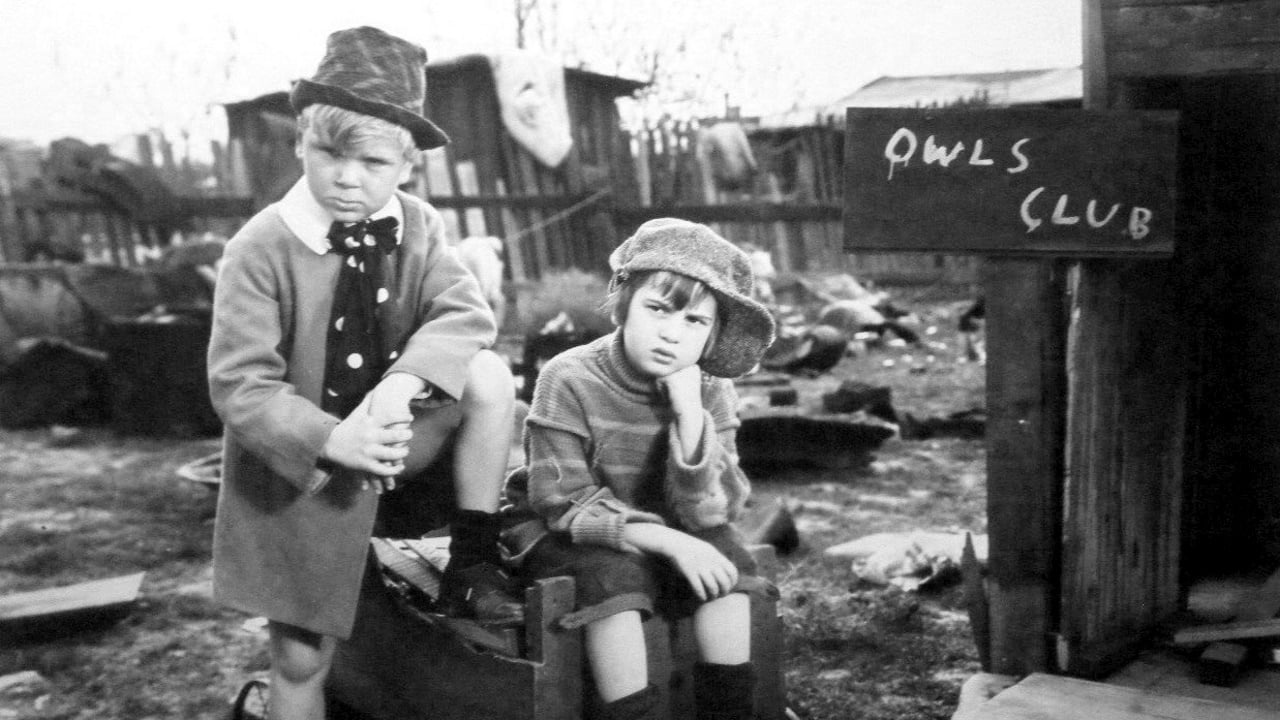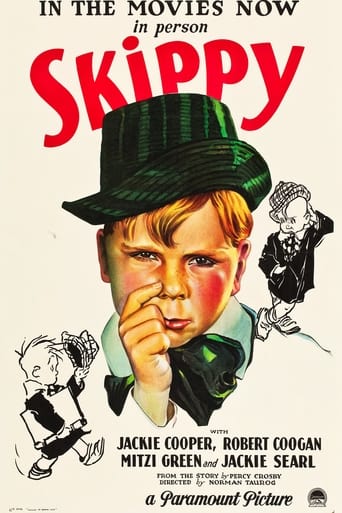

I didn't expect much from "Skippy." How substantial could a Depression-era movie based on a comic strip be? But I found myself really into this film. I watched it with my kids and we all really enjoyed it.It's dated for sure, and the precocious antics of the child actors will likely grate on some. But I liked some of the cultural subtleties in this movie that I found parallels for in our current world. Like the hypocrisy found in Skippy's parents, affluent, casually prejudiced people who think poor, underprivileged folk are deserving of medical care (he's a doctor) but not of basic kindness and empathy (when Skippy wants to go to the "other side of the tracks" his mom asks him if he wants to grow up to be like "those" people). Or the tendency of Skippy's parents to underestimate the complexity of a child's world and who dismiss a child's problems because they're deemed less important than those of adults (not to a child, they're not). Jackie Cooper is the rare child actor, especially from that time period, who's able to be truly winning instead of aggravating. He received an Oscar nomination for Best Actor for his performance, I believe the youngest actor to ever achieve that feat. The film was also nominated for Outstanding Production and Best Writing (Adaptation), while Norman Taurog won that year's Oscar for Best Director. I've read that he got Jackie Cooper to cry at key moments in the film by threatening to shoot his dog. What a guy.Grade: A-
... View MoreJackie Cooper (Skippy), Robert Coogan (Sooky Wayne), Mitzi Green (Eloise), Jackie Searl (Sidney), Willard Robertson (Dr Herbert Skinner), Enid Bennett (Mrs Ellen Skinner), David Haines (Harley Nubbins), Helen Jerome Eddy (Mrs Wayne), Jack Clifford (Dogcatcher Nubbins), Guy Oliver (Dad Burkey), Carl R. Botefuhr (Skippy, age 3), Beaudine Anderson (boy), and Dannie MacGrant.Director: NORMAN TAUROG. Scenario: Joseph L. Mankiewicz, Norman McLeod. Dialogue: Joseph L. Mankiewicz, Norman McLeod, Don Marquis. Adaptation: Percy Crosby, Sam Mintz, from the comic strip by Percy Crosby. Photography: Karl Struss. Music: John Leipold. Supervisor: Louis D. Lighton.Copyright 24 April 1931 by Paramount Publix Corp. New York opening simultaneously at the Times Square Paramount and the Brooklyn Paramount, 3 April 1931. U.S. release: 25 April 1931. 7,685 feet. 85 minutes.SYNOPSIS: Boys try to raise $3 to buy a license for their dog.NOTES: Academy Award, Best Directing, Norman Taurog (defeating Clarence Brown's A Free Soul, Lewis Milestone's The Front Page, Wesley Ruggles' Cimarron and Josef von Sternberg's Morocco).Also nominated for Best Picture (Cimarron); Best Actor, Jackie Cooper (Lionel Barrymore in A Free Soul); Writing Adaptation, Mankiewicz and Mintz only (Cimarron).Number 3 in The Film Daily's annual poll of U.S. film critics (Cimarron was first, Street Scene second).COMMENT: Despite the stiff opposition (most critics today would rank Taurog's chances of beating this field at around ten thousand to one), Taurog deserved his Academy Award. His persuasively sympathetic handling of his child stars and the way he has given the film pace by extremely fluid camera-work is faultless. It is unfortunate that the film suffers from the complete absence of a music score (except "natural" music during Skippy's show). That and its quaint costumes (as well as its naive conclusion) make it seem rather dated today, though some scenes still come across with a powerful impact. The story is a simple framework on which the scriptwriters expend a fair amount of ingenuity in developing its plot. But the best thing about it is the dialogue, which has a natural ring to it, yet contrives to be amusing. The children are more convincing and interesting than the adults in the acting department, though Jack Clifford has some glorious moments as the rough-voiced dog-catcher. Karl Struss' superlative photography is another major asset. Production values are — with the exceptions noted above — otherwise excellent.
... View MorePercy Crosby's cartoon "Skippy", premiered in "Life" magazine in 1923 and became an instant success. It featured the doings of Skippy Skinner, a little boy living in the city, who was equally at home stealing apples, playing baseball or just trying to understand the world of adults. At one point, Crosby was earning over $2,000 a week - the strip was a phenomenal success and there were Skippy dolls, toys and comic books. Australia also had it's own version, "Fatty Finn", which was turned into a movie that is still fascinating with it's glimpses of Australian suburban life in the 20s. MGM found an ideal "Skippy" in Jackie Cooper (who claimed he only got the part because his uncle was the director). Regardless, he was perfect in the role and even looked like the character.Skippy would rather hang around in Shantytown "a beautiful place", much to the disgust of his father - a pompous doctor who is head of the local council. With his friend, snivelling Sidney - "say I can get away with murder at my place because I'm nervous and strung high", he makes the accquaintance of Sooky (Robert Coogan) a child so poor that even the Shantytown kids shun him. "Gee, it's elegant over here - alleys, goats and dumps". Skippy meets Sooky's mother (sad faced Helen Jerome Eddy) and Penny, his "thoroughbred" dog of mixed breeds. Their arch enemy is Harley Nubbins, whose father is the local dog catcher - of course the inevitable happens and Penny is caught. Skippy and Sooky then have to find a way to raise the $3 needed for a dog license. From selling old bottles, running errands to selling lemonade - nothing works, finally they decide to put on a show. Ordinarily things would end happily but in this movie, this is the time when you reach for the tissues. The movie ends on an extremely positive note and I really liked the way it explored the relationship between father and son, how the father sheds his stuffiness and comes to an understanding about his son and his problems and instantly goes about trying to help him.Robert Coogan was Jackie's little brother but, unfortunately, he didn't inherit the talent - even though he was very cute as Sooky. He made a follow up, "Sooky", in 1931 and a couple of others and then resurfaced in the 40s. Mitzi Green was mightily talented but you would have to seek out her other movies to see her at her best. In this one she was definitely a minor character, Skippy's neighbour Eloise, who recites poems at the drop of a hat ("Ode to a Dead Dog") and has theatrical ambitions. Jackie Searl had more to do as Sidney, Skippy's sidekick and did what he did best - playing an obnoxious little tattle tale. This is a beautiful little trip down memory lane to a time when children were allowed to be children.Highly Recommended.
... View MoreSKIPPY (1931) has nothing to do with the Childhood of a certain obnoxious and whining 'Sports Commentator' on ESPN, whose arm waving and mugging for the camera is reminiscent of Benito Mussolini. Nor is it directly related to a similarly named (but excellent) peanut butter. It is a heart warming film about Children and their simple but important life forming adventures.The film centers around two (2) characters SKIPPY (Jackie Cooper) and his new found friend SOOKY (Robert Coogan). SKIPPY is from the right side of the tracks, SOOKY the wrong, Shanty Town, which SKIPPY finds far more interesting then his native haunts. Excellently directed by Norman Taurog, slighting neither the Child actors nor the Adult supporting cast, there is a fine morality lesson here showing the importance of friendship and loyalty, both in joyful times and in tragedy. It also shows the importance of parental understanding for Children's problems.Norman Taurog won the Best Directing Oscar for his sensitive handling of what could have become maudlin. Sad to say this film is seldom seen today nor its sequel SOOKY (1931). The film is appropriate today for Parents to watch with their young Children ages four (4) to eight (8) for it still has lessons of value to teach. After those ages in the 21st Century they will be to bored or cynical to care and that's a shame.Note for the Historical challenged, Mussolini (1883>1945) was a minor league Fascist dictator in the first half of the 20th Century. History has not been kind too his legacy. Nor will it be to his imitators, take note IL BAYLESS.P.S. Rewatched today on TCM (02/22/2011) to see if our review holds up, IT DOES! So our only conclusion from the negative votes is that these must be from 'kiss-asses' to SKIPPY 'Peanut Butter For Brains' BAYLESS or sycophants of the ESPN (Eastern SeaBoard Propaganda Network)! Neither attributes flattering to those voters! As for the Peanut Butter SKIPPY. It is our favorite, low fat, extra crunchy.
... View More